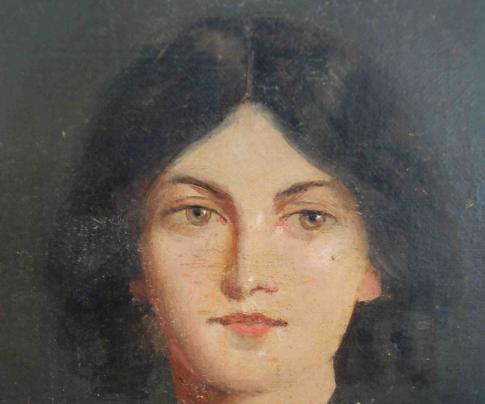Anne Brontë (1820 - 1849)

Anne Brontë was a British novelist and poet...
Anne Brontë was a British novelist and poet, the youngest member of the Brontë literary family.
The daughter of a poor Irish clergyman in the Church of England, Anne Brontë lived most of her life with her family at the parish of Haworth on the Yorkshire moors. For a couple of years she went to a boarding school. At the age of nineteen, she left Haworth working as a governess between 1839 and 1845. After leaving her teaching position, she fulfilled her literary ambitions. She wrote a volume of poetry with her sisters (Poems by Currer, Ellis, and Acton Bell, 1846) and in short succession she wrote two novels. Agnes Grey, based upon her experiences as a governess, was published in 1847. Her second and last novel, The Tenant of Wildfell Hall appeared in 1848. Anne's life was cut short with her death of pulmonary tuberculosis when she was 29 years old.
Anne Brontë is somewhat overshadowed by her more famous sisters, Charlotte, author of four novels including Jane Eyre; and Emily, author of Wuthering Heights. Anne's two novels, written in a sharp and ironic style, are completely different from the romanticism followed by her sisters. She wrote in a realistic, rather than a romantic style. Her novels, like those of her sisters, have become classics of English literature.
Dreams
by Anne Brontë
While on my lonely couch I lie,
I seldom feel myself alone,
For fancy fills my dreaming eye
With scenes and pleasures of its own.
Then I may cherish at my breast
An infant's form beloved and fair,
May smile and soothe it into rest
With all a Mother's fondest care.
How sweet to feel its helpless form
Depending thus on me alone!
And while I hold it safe and warm
What bliss to think it is my own!
And glances then may meet my eyes
That daylight never showed to me;
What raptures in my bosom rise,
Those earnest looks of love to see,
To feel my hand so kindly prest,
To know myself beloved at last,
To think my heart has found a rest,
My life of solitude is past!
But then to wake and find it flown,
The dream of happiness destroyed,
To find myself unloved, alone,
What tongue can speak the dreary void?
A heart whence warm affections flow,
Creator, thou hast given to me,
And am I only thus to know
How sweet the joys of love would be?
Home
How brightly glistening in the sun
The woodland ivy plays!
While yonder beeches from their barks
Reflect his silver rays.
That sun surveys a lovely scene
From softly smiling skies;
And wildly through unnumbered trees
The wind of winter sighs:
Now loud, it thunders o'er my head,
And now in distance dies.
But give me back my barren hills
Where colder breezes rise;
Where scarce the scattered, stunted trees
Can yield an answering swell,
But where a wilderness of heath
Returns the sound as well.
For yonder garden, fair and wide,
With groves of evergreen,
Long winding walks, and borders trim,
And velvet lawns between;
Restore to me that little spot,
With grey walls compassed round,
Where knotted grass neglected lies,
And weeds usurp the ground.
Though all around this mansion high
Invites the foot to roam,
And though its halls are fair within --
Oh, give me back my HOME!
A Fragment
'Maiden, thou wert thoughtless once
Of beauty or of grace,
Simple and homely in attire
Careless of form and face.
Then whence this change, and why so oft
Dost smooth thy hazel hair?
And wherefore deck thy youthful form
With such unwearied care?
'Tell us - and cease to tire our ears
With yonder hackneyed strain -
Why wilt thou play those simple tunes
So often o'er again?'
'Nay, gentle friends, I can but say
That childhood's thoughts are gone.
Each year its own new feelings brings
And years move swiftly on,
And for these little simple airs,
I love to play them o'er -
So much I dare not promise now
To play them never more.'
I answered and it was enough;
They turned them to depart;
They could not read my secret thoughts
Nor see my throbbing heart.
I've noticed many a youthful form
Upon whose changeful face
The inmost workings of the soul
The gazer's eye might trace.
The speaking eye, the changing lip,
The ready blushing cheek,
The smiling or beclouded brow
Their different feelings speak.
But, thank God! you might gaze on mine
For hours and never know
The secret changes of my soul
From joy to bitter woe.
Last night, as we sat round the fire
Conversing merrily,
We heard without approaching steps
Of one well known to me.
There was no trembling in my voice,
No blush upon my cheek,
No lustrous sparkle in my eyes,
Of hope or joy to speak;
But O my spirit burned within,
My heart beat thick and fast.
He came not nigh - he went away
And then my joy was past.
And yet my comrades marked it not,
My voice was still the same;
They saw me smile, and o'er my face -
No signs of sadness came;
They little knew my hidden thoughts
And they will never know
The anguish of my drooping heart,
The bitter aching woe!




 del.icio.us
del.icio.us Digg
Digg

Post your comment